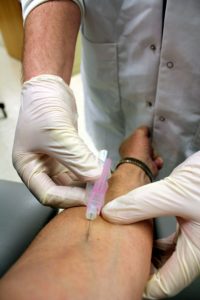If you have been accused of driving while intoxicated (DWI) in Texas you may face a bewildering array of tests. The DWI blood draw process is the most physically-invasive test as well as the most reliable one. However, there are improper procedures that can skew results.
There are numerous uncertainties. The Texas blood test should be carried out as soon as possible after the time of driving, to be reliable for a jury.
Challenges In Texas DWI Blood Draw Procedures
However, it can often take an hour or two before blood is drawn from a DWI suspect. It may take a considerable time for an officer to get to the person to a proper medical testing facility to draw the blood. Officers must also apply for a warrant to draw blood.
In some cases, a police officer may seek to conduct the test in a jail or another facility that’s unsuitable for the purposes and may even impact the reliability of the result.


The DWI blood draw process in Texas
On occasions, the law allows blood to be taken by an individual with less training than a doctor or a nurse. Some police departments have trained people as phlebotomists and there are private companies that can supply phlebotomists on a contractual basis.
Criminal defense attorneys have concerns about their level of training and expertize.
A medical professional should prepare for the blood test. He or she should use a properly prepared blood test kit with a grey top tube. The color designates what kind of tube this is, and if it’s suitable for forensic blood testing. The tube must contain two different substances, an anti-coagulant to prevent blood from solidifying and a preservative to keep the blood from fermenting and creating its own alcohol.
The blood testing kit must not have expired and the test tube to be used for the sample must have a vacuum to prevent contamination prior to a blood test.
There are other potential contamination dangers that an inexperienced or improperly trained party may not be aware of. They must not use an antiseptic that contains alcohol because this could contaminate the blood draw and give an incorrect reading.
On occasions, the person drawing the blood may not obtain a large enough sample for testing. This is a know as a short draw. On occasions, the needle may not be properly inserted, damaging the vacuum and allowing contaminants to get into the blood tube.
There are many ways in which a DWI blood test may be compromised. Site preparation, blood extraction, the needle gauge, the type of needle used in the process, the vacuum tube and storage methods for the sample must be examined to make sure they comply with code.
A failure in the DWI blood draw process can invalidate your drunk driving charge. An experienced Texas DWI attorney can look for errors in testing. Please call us today for a free consultation about your case .
Similar Posts by The Author:
Publicaciones Similares del Autor:
(682) 204-4066 We cannot receive pictures via text so please send those via email or hand deliver to our office.





